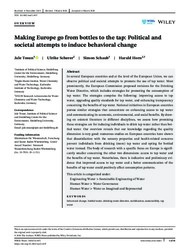Making Europe go from bottles to the tap: Political and societal attempts to induce behavioral change
DOI: https://doi.org/10.1002/wat2.1435
Persistent URL: http://resolver.sub.uni-goettingen.de/purl?gldocs-11858/8922
Persistent URL: http://resolver.sub.uni-goettingen.de/purl?gldocs-11858/8922
Tosun, Jale; Scherer, Ulrike; Schaub, Simon; Horn, Harald, 2020: Making Europe go from bottles to the tap: Political and societal attempts to induce behavioral change. In: Wiley Interdisciplinary Reviews: Water, Band 7, 3, DOI: 10.1002/wat2.1435.
 |
Dokument öffnen: |
In several European countries and at the level of the European Union, we can observe political and societal attempts to promote the use of tap water. Most prominently, the European Commission proposed revisions for the Drinking Water Directive, which includes strategies for promoting the consumption of tap water. The strategies comprise the following: improving access to tap water, upgrading quality standards for tap water, and enhancing transparency concerning the benefits of tap water. National initiatives in European countries pursue similar strategies that concentrate on enhancing access to tap water and communicating its economic, environmental, and social benefits. By drawing on existent literature in different disciplines, we assess how promising these strategies are for inducing individuals to drink tap water rather than bottled water. Our overview reveals that our knowledge regarding the quality dimension is very good: numerous studies on European countries have shown that dissatisfaction with the sensory properties and health-related concerns prevent individuals from drinking (more) tap water and opting for bottled water instead. The body of research with a specific focus on Europe is significantly smaller concerning the other two dimensions: access to tap water and the benefits of tap water. Nonetheless, there is indicative and preliminary evidence that improved access to tap water and a better communication of the benefits of tap water could positively affect consumption patterns.
This article is categorized under:
Engineering Water > Sustainable Engineering of Water,
Human Water > Water Governance,
Human Water > Water as Imagined and Represented.
Statistik:
ZugriffsstatistikSammlung:
Schlagworte:
behavioral changebottled water
drinking water directive
mobilization
sustainability
tap water
This is an open access article under the terms of the Creative Commons Attribution License, which permits use, distribution and reproduction in any medium, provided the original work is properly cited.

